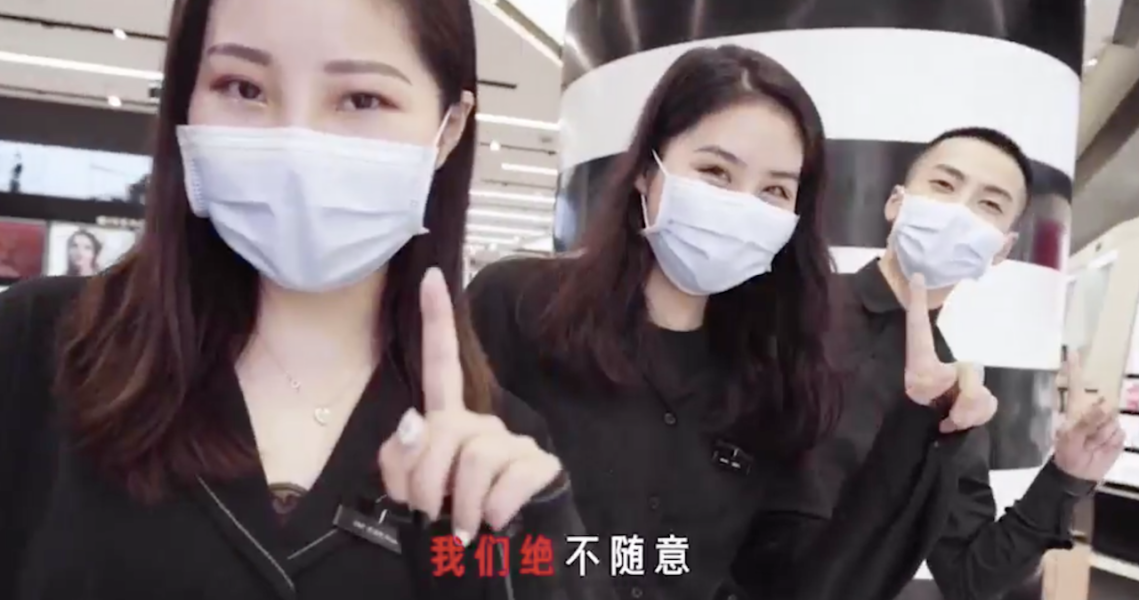Most beauty retailers do not know when they will reopen in the U.S., but they do know their stores aren’t going to look the same as when they closed.
In-store temperature checks, free masks for customers and strict parameters around product testing are among the potential changes beauty retailers are negotiating, as there is no set path to reopen and little to no guidance from the U.S. government.
“We recognize the shopping experience for beauty will be changed forever because of this,” said Credo Beauty co-founder and COO Annie Jackson, who is currently working on a plan for the re-openings of its nine U.S. stores. Credo’s stores are located in New York, Massachusetts, Texas and California, and do not yet have a set reopen date.
Jackson said the Credo team is “discussing everything,” when it comes to store hygiene procedures, and that plans include cleaning the store every two hours and ending self-serve product testing altogether.
For a sense of what the U.S. beauty retail experience may look like, brands can look to re-openings that have already taken place. One video released by Sephora in China used a hip-hop song to outline all the steps that the LVMH-owned retailer is taking. The lyrics said, “You are welcome to browse at your leisure, but we’re definitely not carefree.” It also pointed out Sephora China’s newly implemented customer temperature checks and mask requirements. In addition, it now uses individually wrapped, disposable tools and ensures store sanitization every two hours. Checkout now includes associates spraying packages with disinfectant. Sephora currently has approximately 240 stores in China.

Reopened beauty retailers in South Korea have similar protocols in place. According to an Amorepacific spokesperson, the company’s local brand stores must require all employees to wear masks, have free hand sanitizer available, conduct disinfection of surfaces every two hours, sanitize testers after each use and provide disposable applicators.
Ad position: web_incontent_pos1
“[Providing] testers that are freely open and available for people to try is not going to be able to be done anymore,” said Jackson.
Unmonitored testers had already been in question before the Covid-19 pandemic. In 2017, a California woman sued Sephora, claiming a lipstick tester had given her oral herpes. The two parties reached a settlement with the terms remaining private. In 2018, the Canadian Broadcasting Corporation found staphylococcus aureus bacteria in 40% of product testers across retailers including Shoppers Drug Mart, Sephora, The Body Shop and MAC Cosmetics. But consumers continued to rely on testers to help them decide what to buy. Virtual experiences have not yet eliminated the need to touch and feel product in real time.
According to Jackson, “Testers are an integral part of someone purchasing a product.” She said Credo is considering an alternative system, in which only staff members are allowed to apply products to try. Clean beauty, she noted, is especially reliant on product testing, given consumer conceptions about the efficacy of clean products. “I don’t think it’s insurmountable, but we also don’t have the answer yet.”
“Beauty is such a sensorial thing. You really need to test, feel and try the product,” said Jessica Richards, the founder of Shen Beauty, a small luxury beauty store in Brooklyn. Shen Beauty will be outfitting its staff with branded face masks and gloves, requiring guests to sanitize their hands and providing a hand sanitizer that it is formulating itself for free with every purchase.
“Makeup testers at mass retailers like Sephora and Ulta have always been just disgusting,” said Richards. “We have always sprayed 99% alcohol [onto products] in between every person trying [them]. But what I’m trying to figure out is a way — and I haven’t figured this out yet — for each individual person to never touch the tester.”
Ad position: web_incontent_pos2
Space NK is anticipating the removal of testers, according to a spokesperson, but the company is waiting on government guidelines in the U.S. and the U.K. to come out with a final reopening policy. Credo Beauty is also waiting for guidance from the CDC and state cosmetology boards in the U.S. In areas like San Francisco and New York, masks are already required in essential locations that are open, such as grocery stores.
Retailers are not all planning to be fully operational immediately. “Right now, we are [planning] for doors to open in a staggered fashion,” said Jackson. This would include four phases that would begin with online order pick-up in-store, and then move to a shop-by-appointment model, followed by limited capacity in-store and then “what we deem our new normal,” she said. Texas recently announced it will allow businesses to open at 25% of their total capacity starting on May 1.
A staggered opening model will only be possible for a small number of tech-savvy retailers, according to Chris Hogue, the vp of strategy and products at customer experience and commerce agency LiveArea. “The majority of smaller retailers don’t have the capability” of buy-online, pick up in-store. He cited a report from warehouse management firm Tecsys, which found that in 2019, less than 30% of all retailers had buy-online, pick-up in-store capabilities. Large beauty retailers like Ulta typically do have this, but it has stopped offering the service in tandem with its stores closures.
When it comes to certain safety measures, such as temperature checks, U.S. customers might avoid stores with measures they view as too draconian. Temperature checks, which are now required to enter virtually every building in China, are already being conducted on employees at large retailers such as Walmart and Amazon in the U.S.
“Customers have many other options to purchase products if they do not like the requirements a store puts on them, such as dot-com stores or visiting another retailer that has chosen not to follow the letter of the law as closely,” said Hogue. He predicted that any U.S. store requiring customer temperature checks will “likely find their store pretty empty.”




